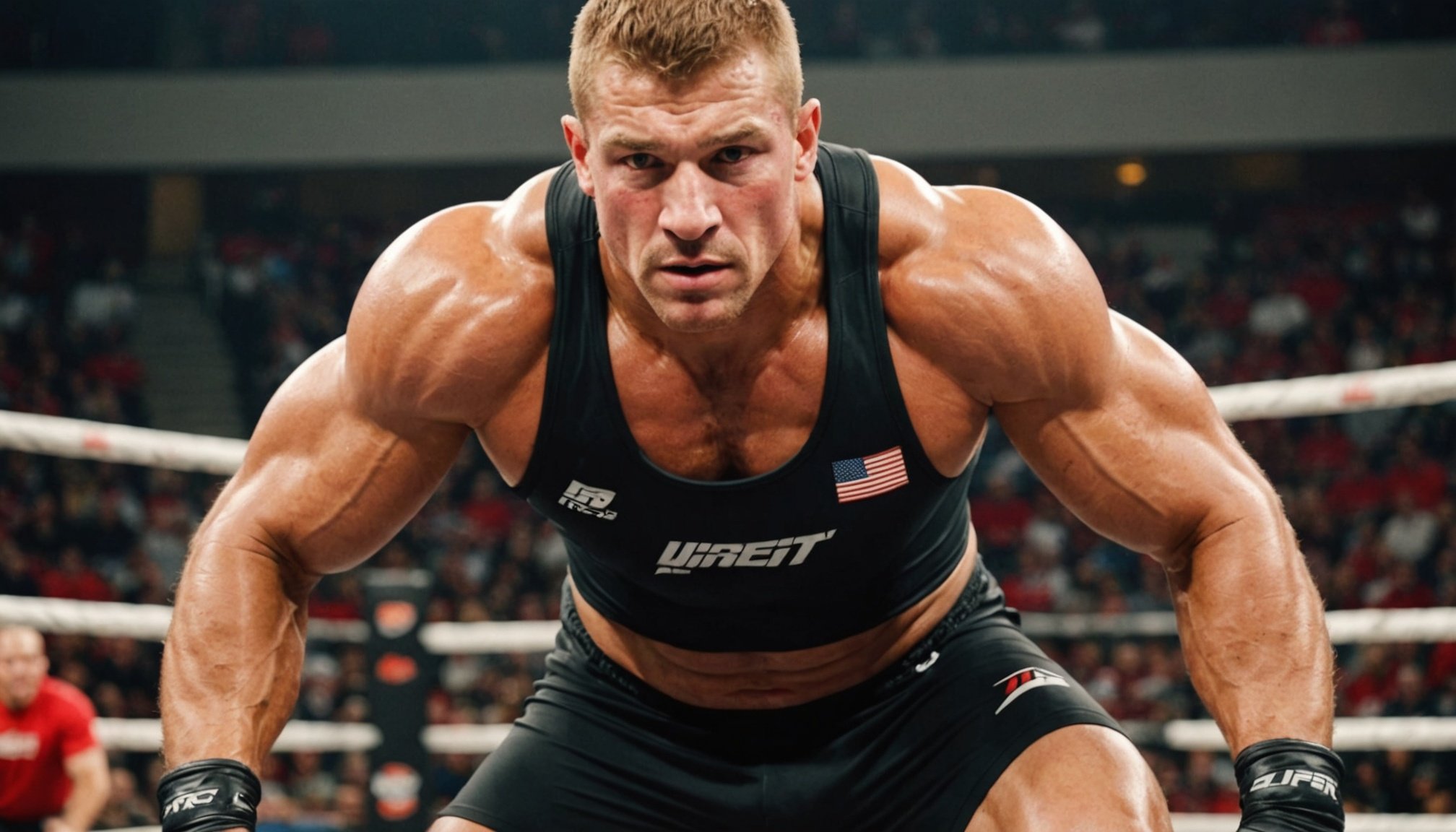Unleash Your Potential: Expert Nutrition Strategies for Wrestlers to Achieve Ideal Weight and Muscle Growth
The Importance of a Balanced Diet for Wrestlers
When it comes to wrestling, having the right nutrition plan is as crucial as mastering the techniques on the mat. A balanced and nutritious diet is the foundation upon which wrestlers build their strength, endurance, and overall athletic performance. Here’s why a well-planned diet is essential:
Macronutrient Balance
Wrestlers need to focus on the right balance of macronutrients: protein, carbohydrates, and fats. Each of these macronutrients plays a distinct role in fueling workouts, aiding in recovery, and supporting muscle growth.
Have you seen this : Achieving tranquility before the glide: key techniques for ice skaters to manage nerves and enhance performance
-
Protein: This is the building block of muscles and is vital for muscle recovery and growth. High-protein diets help promote muscle repair after intense wrestling sessions. Sources like lean meat, poultry, fish, eggs, and plant-based proteins should be staples in a wrestler’s diet. Aim for 1.8 to 2.7 grams of protein per kilogram of body weight daily[4].
-
Example: If you weigh 70 kg, aim for 126 to 189 grams of protein per day.
This might interest you : Mastering Breath Control for Synchronized Swimming: Top Techniques for Underwater Excellence
-
Quote: “Protein is the building block of muscles and aids in muscle recovery. High-protein diets can help promote muscle growth and repair after intense wrestling sessions”[1].
-
Carbohydrates: These provide the body with energy and are essential for glycogen replenishment. Choosing complex carbs over simple ones can help maintain energy levels without adding extra pounds. Include foods like whole grains, fruits, vegetables, and legumes in your diet[1].
-
Example: Whole grain bread, brown rice, and quinoa are excellent sources of complex carbohydrates.
-
Fats: These should not be overlooked as they provide energy, absorb vitamins, and are essential for hormonal balance. Unsaturated fats found in avocados, nuts, seeds, and olive oil can be beneficial[1].
Hydration and Weight Loss
Hydration is often underestimated but is crucial for wrestlers. Dehydration can lead to reduced muscle strength, impaired cognitive function, and an increased risk of injury.
- Water Intake: Drinking ample water throughout the day can boost metabolism, aiding in weight loss. It also helps maintain the body’s electrolyte balance, crucial for muscle contraction and energy production[1].
- Tip: Aim to drink at least 8-10 glasses of water per day.
Timing and Portion Control in Your Diet
Managing when and how much you eat is as important as what you eat. Here are some tips to help wrestlers maintain energy levels while cutting weight:
Eating at Regular Intervals
Eating smaller meals more frequently throughout the day can prevent overeating or under-eating, both of which can negatively affect performance.
-
Breakfast: Start your day with a balanced breakfast that includes all macronutrients. This kicks off your metabolism and fuels the body for the day ahead[1].
-
Example: A breakfast could include scrambled eggs, whole grain toast, and a glass of orange juice.
-
Snacking: Eat smaller meals every 2-3 hours to maintain energy levels. Include snacks rich in protein and complex carbohydrates.
-
Example: A mid-morning snack could be a handful of nuts and a piece of fruit.
Portion Control
Controlling portions is key to maintaining weight and ensuring you are not overeating or under-eating.
- Meal Planning: Plan your meals in advance to ensure you are getting the right amount of calories and macronutrients.
- Tip: Use a food diary to track what you eat and stay on target with your macro goals[4].
Importance of Off-Season Nutrition
Off-season nutrition is just as critical as in-season nutrition for wrestlers. Here’s why:
Rebuilding and Repairing
The off-season is a time to rebuild and repair the body while maintaining a healthy weight. An off-season diet should be rich in lean proteins, complex carbs, and healthy fats.
- Balanced Diet: Ensure your diet includes a balanced intake of proteins, carbohydrates, and fats. This helps in maintaining muscle mass and overall health[1].
- Example: Include lean proteins like chicken and fish, complex carbs like whole grains, and healthy fats like avocados in your diet.
Consulting a Sports Nutritionist
Consulting a sports nutritionist can provide personalized guidance for a diet plan that meets individual needs and goals.
- Personalized Advice: A sports nutritionist can help you create a tailored diet plan that considers your specific weight class, training schedule, and health goals.
- Quote: “Consulting a sports nutritionist can provide personalized guidance for a diet plan that meets individual needs and goals”[1].
Optimizing Protein Intake for Muscle Growth
Protein intake is a critical aspect of a wrestler’s diet, especially when it comes to muscle growth and recovery.
How Much Protein Do You Need?
The optimal amount of protein intake is a topic of ongoing research, but here are some key findings:
-
General Recommendations: Aim for 1.8 to 2.7 grams of protein per kilogram of body weight daily. This range supports muscle growth and repair[4].
-
Example: For a 70 kg wrestler, this would be 126 to 189 grams of protein per day.
-
Advanced Research: Some studies suggest that protein intakes exceeding 1.6 g/kg/day can lead to further increases in fat-free mass (FFM) or lean body mass (LBM), especially in trained individuals[2].
Timing of Protein Intake
The timing of protein intake can also impact muscle growth and recovery.
- Post-Workout: Consuming protein within 30-60 minutes after a workout can help in muscle recovery and protein synthesis.
- Example: A post-workout shake with 20-30 grams of protein can be beneficial.
- Quote: “Eating enough protein is crucial, but don’t forget about carbs and fats. These macros fuel your workouts and help your body recover”[4].
Avoiding Common Mistakes in In-Season Strength Training
In-season strength training is crucial for maintaining strength and endurance, but there are common mistakes that wrestlers should avoid.
Neglecting Strength Maintenance
Many wrestlers reduce or stop lifting during the season, fearing it will lead to fatigue or injury.
- Solution: Prioritize low-volume, high-intensity sessions to maintain strength without overtraining. Focus on compound lifts like deadlifts, squats, and presses to preserve power and stability[5].
Overtraining
Weight cutting, intense practices, and frequent matches can push wrestlers into overtraining.
- Solution: Adjust training intensity and volume based on competition schedules. Plan lighter “deload” weeks to allow for recovery and peak performance[5].
Ignoring Recovery and Rest
Wrestlers often neglect recovery, pushing through exhaustion and limiting their performance.
- Solution: Emphasize proper sleep, nutrition, and hydration. Space out strength sessions to ensure recovery and optimize energy levels for matches[5].
Practical Tips for Wrestlers
Here are some practical tips to help wrestlers achieve their ideal weight and muscle growth:
Tracking Your Macros
- Use a Food Diary: Track what you eat to stay on target with your macro goals. This helps in ensuring you are getting the right amount of calories and macronutrients[4].
Incorporating High-Intensity Interval Training (HIIT)
- HIIT Workouts: Use HIIT to burn fat and improve fitness quickly. Combine sprints with weighted exercises for best results[4].
Prioritizing Recovery
- Active Recovery: Use active recovery techniques on rest days and aim for consistent sleep times to help muscles repair and grow[4].
Table: Comparing Different Protein Intake Recommendations
| Source | Recommended Protein Intake | Target Audience |
|---|---|---|
| General Recommendations | 1.8 to 2.7 grams/kg/day | Wrestlers and athletes[4] |
| Morton et al. (2018) | ~1.6 g/kg/day | Trained lifters[2] |
| Tagawa et al. (2020) | Exceeding 1.6 g/kg/day for additional gains | Trained lifters[2] |
| Willoughby et al. (2007) | 2.06-2.31 g/kg/day plus supplements | Trained lifters[2] |
List: Key Nutritional Supplements for Wrestlers
- Protein Powders: Useful for meeting high protein goals, especially post-workout.
- Example: Whey protein or plant-based protein powders.
- Creatine: An ergogenic aid that can improve strength and endurance.
- Example: Take 3-5 grams of creatine per day.
- BCAAs (Branched-Chain Amino Acids): Help in reducing muscle soreness and improving recovery.
- Example: Take 5-10 grams of BCAAs during or after workouts.
- Electrolyte Supplements: Important for maintaining electrolyte balance, especially during intense training.
- Example: Use electrolyte-rich drinks or tablets during and after workouts.: Sustainable Weight Management and Muscle Growth
Achieving the ideal weight and muscle growth as a wrestler requires a holistic approach that includes a well-structured nutrition plan, high-intensity training, and proper recovery strategies. Here are the key takeaways:
- Gradual Weight Loss: Aim for gradual weight loss rather than rapid weight reduction. Reduce calorie intake by 500-1000 calories per day to achieve a safe weight loss of 1-2 pounds per week[1].
- Balanced Diet: Ensure a balanced intake of proteins, carbohydrates, and fats, along with sufficient hydration.
- Consult Professionals: Consult a sports nutritionist for personalized dietary advice.
- Avoid Common Mistakes: Avoid overtraining, neglecting recovery, and using generic weightlifting programs.
By following these expert nutrition strategies, wrestlers can unleash their full potential, achieve their ideal weight, and build the muscle mass necessary for peak athletic performance. Remember, a well-planned diet combined with consistent training and recovery is the key to success in wrestling.











